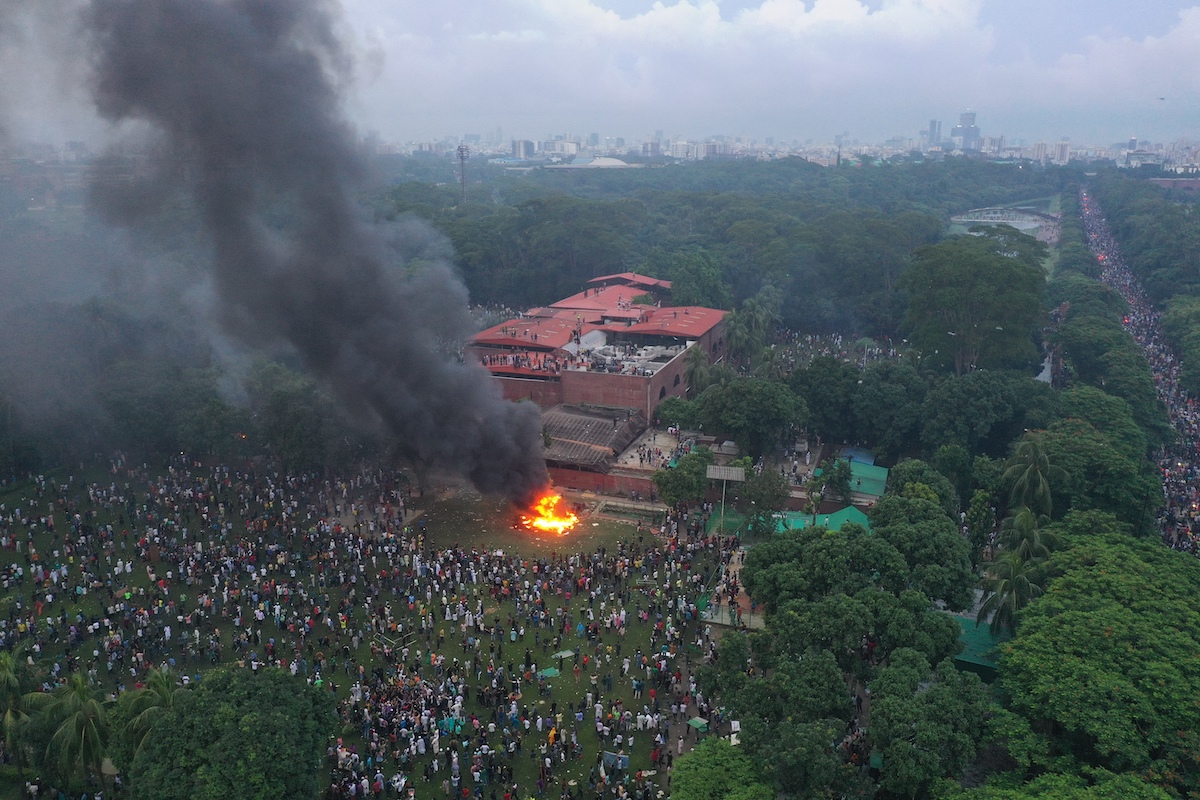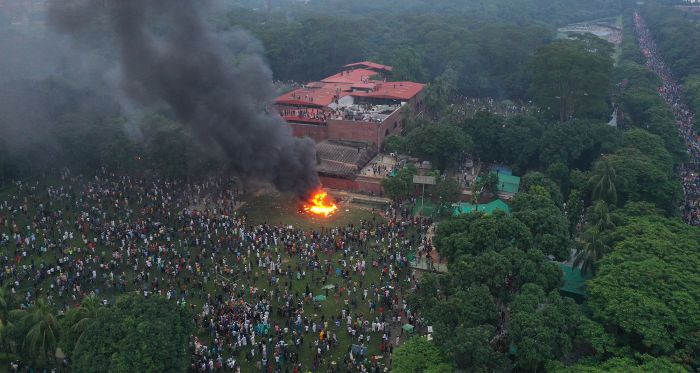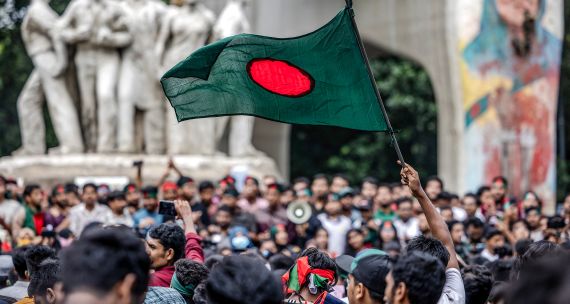Bangladesh’s longest-serving prime minister, Sheikh Hasina, who ruled for over 20 years with an iron fist, resigned from office on August 5 and fled to India. Her dramatic exit followed a month-long, student-led protest movement that began with an agenda of reforming government job quotas but spiralled into a mass uprising calling for Hasina’s resignation and democratic reforms. More than 300 people have been killed since protests erupted on July 1; on August 4 alone, nearly 100 people died as the Hasina government brutally cracked down on protesters, including mass arrests and shoot-on-sight orders, as well as a curfew and an internet and communications blackout.
As protesters defied the nationwide curfew and marched toward the prime minister’s official residence on August 5, Hasina was reportedly given a 45-minute ultimatum by the country’s security forces to resign and leave before angry mobs stormed her home.
Although Bangladesh’s army chief Waker-uz-Zaman immediately announced that an interim government will be formed and vowed to restore law and order, the crisis appears far from over. While jubilant crowds took to the streets to celebrate Hasina’s fall, fears have mounted over a cycle of retaliatory violence.

A dangerous political vacuum now appears to be engulfing Bangladesh, the world’s eighth-most populous country, with more than 171 million people, raising uncertainties about its democratic and economic future. The situation may also engender broader regional instability. It could complicate Dhaka’s relations with India, its longstanding ally, and create opportunities for India’s regional rivals – Pakistan and China – to forge partnerships that could threaten New Delhi.
Why is Hasina’s fall a foreign policy dilemma for India?
Sheikh Hasina’s arrival at Hindon Air Force Base on the outskirts of New Delhi, shortly after fleeing Dhaka, presents India with a unique foreign policy challenge. No Indian government could refuse an urgent call for help from an old and loyal friend – the closest and perhaps only dependable ally India has left in South Asia amid China’s growing inroads in the neighbourhood. However, sheltering Hasina could jeopardize New Delhi’s relationship with the new guard in Dhaka. Furthermore, if Bangladesh’s new government decides to prosecute their former prime minister for the alleged murder and torture of dissidents, New Delhi would face the possibility of being asked to extradite her.
Media reports have speculated that Hasina will seek asylum in the U.K., suggesting that her stay in India will be temporary. However, the U.K. Home Office told NDTV, an Indian news channel, that British immigration rules do not allow individuals to travel to the U.K. specifically to seek asylum. NDTV also reported that Hasina’s son has “categorically” rejected claims that she has sought asylum “anywhere,” possibly meaning that she could overstay her welcome in India.
India, which played an instrumental role in Bangladesh’s liberation from Pakistan in 1971, has long been seen as a powerful external backer of Hasina. New Delhi had refrained from condemning the alleged human rights violations committed by her government and did not join the Western governments that called her out for suppressing democratic ideals during her re-election in January. Hasina began a fourth consecutive term as prime minister after that election, which was widely seen as neither free nor fair.
In recent months, resentment among Bangladeshis over Hasina’s repressive policies has translated into anti-India sentiment, as New Delhi was seen as a key supporter of her government. This sentiment has sparked an 'India Out' campaign, including a boycott of Indian products. Following her ouster, many in New Delhi fear reprisals against the 19,000 Indian nationals who remain in Bangladesh, along with Indian business interests and consular offices.
While Dhaka has enjoyed stellar relations with New Delhi for the most part, the relationship was bolstered by the personal friendships between Hasina and successive regimes in India, as well as the robust security partnership forged between the two countries during Hasina’s reign. Following the assassination of her father, the former president Sheikh Mujibur Rahman, in a military coup in 1975, Hasina spent six years in India under the protection of the Indian government.
The Indian security establishment, in turn, had relied on Hasina’s government to crack down on radical Islamist groups in Bangladesh that threaten Indian security as well as rebels from India’s northeast who had taken shelter in the country. A return to power of Hasina’s arch nemesis and former prime minister Begum Khaleda Zia’s Bangladesh Nationalist Party (BNP), which ruled Bangladesh most recently in a coalition with the Jamaat-e-Islami party between 2001 and 2006, would be perceived by Indian officials as a major security threat. During the BNP’s rule, the bilateral relationship nosedived, especially as New Delhi perceived that the BNP government was ignoring its security concerns.
The crucial question now is whether Hasina’s friendship with India will overshadow New Delhi’s future relations with Dhaka. With India’s influence declining among nearly all its South Asian neighbours, Hasina’s fall is a major loss for India.
What are the regional implications of Hasina’s ouster?
Bangladesh’s strategically significant location on the Bay of Bengal in the northeastern Indian Ocean makes it a crucial regional and geopolitical partner, not just for India but also for China and other actors, for military and trade purposes. The country, which shares a 4,000-kilometre border with India, lies on India’s eastern frontier, is a vital link between the Indian heartland and its northeastern states, and connects India to Southeast Asia. Sheikh Hasina’s fall has already prompted New Delhi to beef up security along the two countries’ border.
Despite the critical role played by Chinese investments in Bangladeshi infrastructure projects, Hasina managed to maintain close economic ties and development co-operation with India – one of China’s regional rivals. Recently, India offered to partner with Bangladesh on the Teesta Reservoir Project, which China was also pursuing. The project’s location, close to the Siliguri Corridor – also called the “Chicken's Neck” – is strategically vital for India.
Following her attendance at Indian Prime Minister Narendra Modi’s swearing-in ceremony in June, Hasina was the Modi 3.0 government’s first guest on an official state visit. During her visit, the two sides inked critical deals on maritime security and the ocean economy. Soon after, Hasina travelled to Beijing, but her trip was cut short as she returned with a meagre US$137-million assistance package, far less than the US$5-billion loan she was expecting. With Hasina’s departure, Beijing may be wary of growing instability in the region, but it may also sense an opportunity to expand its strategic and economic influence.
As Dhaka navigates this competition between New Delhi and Beijing, it also faces the consequences of a civil war raging in neighbouring Myanmar. Cox’s Bazar, in southeastern Bangladesh, houses nearly one million Rohingya refugees who rely on international humanitarian assistance that is rapidly being depleted. Canada’s strategy for responding to the Rohingya crisis in Myanmar and Bangladesh expired in March 2024.
Another possible regional fallout from Sheikh Hasina’s ouster stems from reports that temples, houses, and businesses belonging to Bangladesh’s minority Hindu community are being attacked. While Hasina was largely seen as a proponent of secularism, and her government provided protection to religious minorities, violence against Hindus appears to be driven by radical Islamists, who many in India believe to be close to Pakistan. These radical Islamists have been linked to Jamaat-e-Islami, an Islamist party that resisted Bangladesh’s liberation from Pakistan in 1971 on the grounds of religious unity. Bangladesh’s independence, led by Hasina’s father, was founded on secular principles, even though more than 90 per cent of the country’s population is Muslim.
What happens next?
On August 6, President Mohammed Shahabuddin dissolved Bangladesh’s parliament, clearing the way for an interim administration. That same night, Nobel laureate economist and pioneer of microfinance in Bangladesh, Muhammad Yunus – also a staunch critic of Hasina – was appointed as the chief advisor of the interim government. Student groups leading the protests had demanded Yunus’s appointment. Meanwhile, former prime minister and BNP leader Khaleda Zia, who was convicted on corruption charges in 2018, has been released from house arrest.
While the military leadership has assumed responsibility for installing a new administration, it is not immediately clear how soon free and fair elections will take place and what the army’s role will be. Pro-democracy groups would likely be displeased with any full-fledged army takeover.
The possible role of the military in a post-Hasina order raises significant questions, given Bangladesh’s history of military coups and army rule. The country was ruled by the military from 1975 to 1990, and a military-backed government was in power most recently between 2006 and December 2008, after which Sheikh Hasina’s Awami League won a landslide election.
Although Hasina deployed the army to quell the escalating protests, Reuters reported that by the evening of August 4, army officials had grown reluctant to open fire on civilians to enforce the curfew she had imposed. Moreover, the Bangladeshi daily Prothom Alo has reported that top army and police officials played a critical role in convincing Hasina to step down. U.S. State Department spokesperson Matthew Miller commended the Bangladesh army for its “restraint” after Hasina’s exit.
Alongside the political crisis, the new political dispensation in Bangladesh will also be tasked with managing an economy in tatters: about two-fifths of the country’s young population lacks reliable employment; inflation hovers at around 10 per cent; and a balance-of-payments crisis looms large due to capital transfers out of the country made by the crony class. The readymade garments sector, which exported apparel worth US$38.4 billion last year and accounts for 83 per cent of Bangladesh's export earnings, has been hit hard by the political turmoil, which may jeopardize the country’s reputation as an investment destination for Western companies.
What are the implications for Canada and other Western players?
As the wider regional, geopolitical, and economic implications of the “seismic” shift in Bangladesh unfold, stakeholders in the West are watching with caution. On August 6, Bangladesh’s principal garment manufacturers’ body reportedly called for a shutdown of all manufacturing facilities amid a deepening of the crisis. The move is expected to hurt Western apparel giants such as H&M and Zara. Several Canadian brands, including Hudson’s Bay, Mark’s, and Lululemon, source their products from Bangladeshi factories and are expected to be impacted by the turmoil.
For Canada, a silver lining in Hasina’s ouster might come from the fact that Ottawa seemingly failed to address her government’s charge that Nur Chowdhury, her father’s alleged assassin, has been living with impunity in Canada for the past 28 years.
On August 5, Canadian foreign minister Mélanie Joly issued a statement calling for a “quick and peaceful return to a democratic and inclusive civilian-led government in Bangladesh,” condemning human rights violations and the brutal crackdowns and reiterating Canada’s support for the people of Bangladesh. As the U.S. urged all sides to “refrain from further violence,” the European Union has called for “calm and restraint.” Meanwhile, diasporic groups of Bangladeshi origin in several Western countries, such as Australia, the U.K., the U.S., as well as Canada, celebrated what many of them regard as a “second independence,” calling for a peaceful transition to democracy.
• Edited by Erin Williams, Senior Program Manager, and Vina Nadjibulla, Vice-President Research & Strategy, APF Canada.





